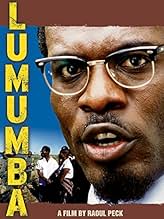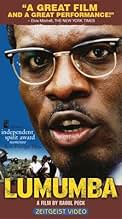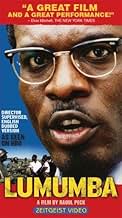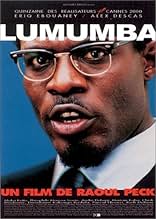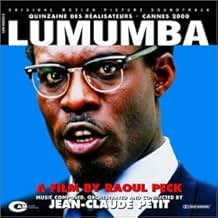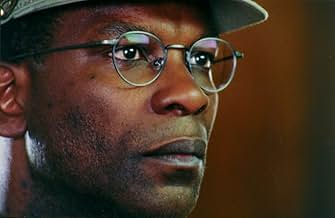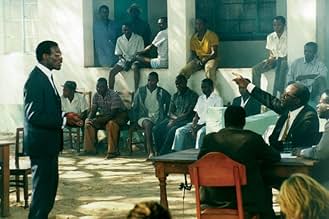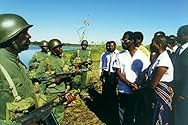Lumumba
- 2000
- Tous publics
- 1h 55m
IMDb RATING
7.2/10
2.2K
YOUR RATING
The true story of controversial leader of independent Congo Patrice Lumumba.The true story of controversial leader of independent Congo Patrice Lumumba.The true story of controversial leader of independent Congo Patrice Lumumba.
- Director
- Writers
- Stars
- Awards
- 3 wins & 8 nominations total
Théophile Sowié
- Maurice Mpolo
- (as Théophile Moussa Sowie)
Makena Diop
- Thomas Kanza
- (as Oumar Diop Makena)
Dieudonné Kabongo
- Godefroid Munungo
- (as Dieudonné Kabongo Bashila)
Pascal N'Zonzi
- Moïse Tshombe
- (as Pascal Nzonzi)
- Director
- Writers
- All cast & crew
- Production, box office & more at IMDbPro
Featured reviews
10Anyanwu
This movie is the best movie I have seen in a long time. It is also the best movie seen that uses a drama to tell history, without going to speculation such as with JFK,Nixon or Hoffa. It deftly depicts the clutches that Belgium had on the Congo. It also teases out easily for us the European and American forces that were behind the power the inflict the Congo today. The film was sure to specifically implicate the U.S., rightly so, in the murder of Lumumba. This film could never be made in the U.S. for U.S. film rarely criticizes itself in acts of imperialism and murder. (Save Stone's JFK) It also lets us in on the problems that were present with the inner conflict of the Congo, between Lumumba, Mobutu and Katanga. We can see how precarious countries sit in establishing new governments when their history is one of colonization and those who were the colonizers continue to pull the strings of power and force. The film is excellently shot with Eriq Ebouaney an excellent Lumumba. The cast is great and they really draw you into the feeling of the climate in the Congo during that time.
Again, this is a must see for those who love drama with a correct historical background. See my notes on Quilombo.
Again, this is a must see for those who love drama with a correct historical background. See my notes on Quilombo.
I feel very fortunate to have the chance to not only watch this film, but also learn more about this fascinating person and time. Lumumba is an outstanding portrayal, giving a full sense of the story without falling into the usual Hollywood trappings - yes, he is shown with his wife and children, but the essence of the story is his politics and those of the still-emerging independent Congo. The film is brilliantly made, moving along at a pace that is consistently engaging. I look forward to seeing other Raoul Peck films, as well as more from Eric Ebouaney!
I just saw this movie last night, 2/21/02, on HBO TV in New York and noticed a fascinating and rare bit of censorship within it. In one late scene in the movie when Congo politicians and 1-2 Americans meet around table and vote whether Lumumba is to be captured/killed, the apparent American, perhaps a CIA officer, is addressed by Gen. Mobutu and asked how he wants to vote. But the American's name uttered by Mobutu is bleeped out in the televised version I saw and heard. Then in the film's final credits, this same character's name is masked over and appears only as "Mr......" played by actor Dennis Thatcher. So what IS the name of the mysterious man, no doubt too accurately identified, in this movie, airing on American TV some 2 years after it was made.
I liked this film but to like it, you must know more about the history of Congo. You must also know some more about Belgians and their disrespect (and that is a metaphore!) of the Congolese state.
Lumumba and the Congolese people didn't deserve this as he was right. We Belgians did exploit them for decades. But just because Lumumba reacted not so friendly to Bwana Kitoko (the king was called this way by the Congolese in a previous visit, he was hailed as a great leader) they had to further destabilize Congo and assassinate Lumumba. So he called for the help of the USSR, that was his only option as everybody else was against him. For the Congolese people the US didn't do anything like they did for us with the Marshall Plan. They did support Mobutu's cruel dictatorial rule with lots of money. What good did that do for the average Congolese?
And the trouble didn't stop with the flight of Mubutu. In modern sociological terms, Congo is considered a failed state. And that has it's reasons (and we Belgians are responsible for a large part of those). I hope that Lumuba's dream will still come true and that the Congolese peace process will last so peace and a way of living that is accepted by all Congolese may finally come for them.
Back to the film: You can't expect to understand the complex situation the new independent Congo was put in just by watching this film. That's like thinking the film Enemy at the Gates will explain me everything about the battle of Stalingrad. The film is restricted in many ways and the viewer must understand that. first: It's a film, not a documentary. Some of the scenes are interpretations but they are needed for the plot. second: The main character is Lumumba. Not everything about the troubles in Katanga or elsewhere is told, neither is everything about Mobutu told. It would have been an endless film that way. third: The film is an African film, let them create their own ways of telling this story. White people shouldn't tell them how to tell a story. But I'm glad that some funded this film that tell some people more about an unclear history. It might encourage them to find out more about Lumumba or various other things after the credits roll away and that is a good thing.
Lumumba and the Congolese people didn't deserve this as he was right. We Belgians did exploit them for decades. But just because Lumumba reacted not so friendly to Bwana Kitoko (the king was called this way by the Congolese in a previous visit, he was hailed as a great leader) they had to further destabilize Congo and assassinate Lumumba. So he called for the help of the USSR, that was his only option as everybody else was against him. For the Congolese people the US didn't do anything like they did for us with the Marshall Plan. They did support Mobutu's cruel dictatorial rule with lots of money. What good did that do for the average Congolese?
And the trouble didn't stop with the flight of Mubutu. In modern sociological terms, Congo is considered a failed state. And that has it's reasons (and we Belgians are responsible for a large part of those). I hope that Lumuba's dream will still come true and that the Congolese peace process will last so peace and a way of living that is accepted by all Congolese may finally come for them.
Back to the film: You can't expect to understand the complex situation the new independent Congo was put in just by watching this film. That's like thinking the film Enemy at the Gates will explain me everything about the battle of Stalingrad. The film is restricted in many ways and the viewer must understand that. first: It's a film, not a documentary. Some of the scenes are interpretations but they are needed for the plot. second: The main character is Lumumba. Not everything about the troubles in Katanga or elsewhere is told, neither is everything about Mobutu told. It would have been an endless film that way. third: The film is an African film, let them create their own ways of telling this story. White people shouldn't tell them how to tell a story. But I'm glad that some funded this film that tell some people more about an unclear history. It might encourage them to find out more about Lumumba or various other things after the credits roll away and that is a good thing.
9imxo
To answer the question of a previous reviewer who asked the name of the U.S. official mentioned in "Lumumba", the name of the character is "Mr. Carlucci." Frank Carlucci is reported as having been at that time Second Secretary at the U.S. Embassy in the Congo. Subsequently, among other assignments, he was appointed U.S. Ambassador to Portugal, Deputy Director of the Central Intelligence Agency, Secretary of Defense, and is now the Chairman of the Carlyle Group. It's hardly surprising that Carlucci's biographical sketch on his www.carlylegroup.com web site fails to credit his service in the Belgian Congo. If his name was deliberately censored from the HBO version of "Lumumba" it may have been to avoid the possibility of HBO's being sued in U.S. courts. Carlucci's name, however, is clearly mentioned in the theatre version of "Lumumba" that I saw recently. In the event, I expect that he would deny any involvement in Lumumba's murder.
Others have commented on the evenhandedness with which the film "Lumumba" treats the parties concerned: Lumumba-supporters, other Congolese, even Belgians. A somewhat more sinister view emerges, I think, from the BBC documentary entitled "Who Killed Lumumba?", based on the book "The Murder of Lumumba" by Belgian historian Ludo de Witte. When examined closely, these films demonstrate that the fate of Lumumba and the history of the Congo is not just a matter of black and white. Only Lumumba's murderers believe that.
Others have commented on the evenhandedness with which the film "Lumumba" treats the parties concerned: Lumumba-supporters, other Congolese, even Belgians. A somewhat more sinister view emerges, I think, from the BBC documentary entitled "Who Killed Lumumba?", based on the book "The Murder of Lumumba" by Belgian historian Ludo de Witte. When examined closely, these films demonstrate that the fate of Lumumba and the history of the Congo is not just a matter of black and white. Only Lumumba's murderers believe that.
Did you know
- TriviaRaoul Peck had already made a film about Lumumba in 1992: the documentary Lumumba: La mort du prophète (1991).
- GoofsWhen Lumumba arrives at Brussels airport for a round table conference, an Airbus A300 and Lockheed C-141 Starlifter can clearly be seen. Both of these aircraft had not yet entered into service and flown at the time the event took place in 1960. Airbus A300 made its first flight on 28 October 1972, twelve years later; and Lockheed C-141 Starlifter made its first flight on 17 December 1963, three years after the conference.
- Quotes
[first lines]
Patrice Émery Lumumba: [voice over narration] You never knew about that night in Katanga. No one was to know.
- Alternate versionsFrank Carlucci, who was second secretary at the U.S. embassy in the Congo at the time of Lumumba's assassination, is portrayed in one scene discussing the murder with U.S. Ambassador Clare Timberlake and several Belgian and Congolese officials. Carlucci threatened to sue U.S. distributor Zeitgeist Films if his name was not removed from the movie. Zeitgeist was too small to fight any potential lawsuit, so all non-theatrical U.S. releases of the film (including the version shown on HBO and potential VHS and DVD releases) have Carlucci's name bleeped from the dialogue and masked in the closing credits.
- ConnectionsFeatured in Exterminez toutes ces brutes: Who the F*** is Columbus? (2021)
- How long is Lumumba?Powered by Alexa
Details
Box office
- Gross US & Canada
- $352,296
- Gross worldwide
- $352,296
- Runtime
- 1h 55m(115 min)
- Sound mix
Contribute to this page
Suggest an edit or add missing content


